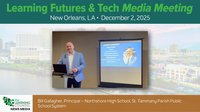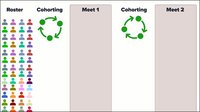Every year, school leaders look to fill vacancies, and every year, strong teacher candidates are stopped short. Not by a lack of ability, but by inadequate preparation and support systems. These are candidates who’ve completed their coursework, student teaching, and demonstrated their commitment, only to be blocked at the finish line. In a moment when students need stability, support, and skilled educators more than ever, we’re losing talent we can’t afford to waste.
I’ve spent the better part of my career working with systems trying to support teacher pipelines. I’ve sat with district leaders wrestling with last-minute vacancies, talked with teacher candidates one step away from the classroom, and worked alongside organizations building smarter, fairer on-ramps into the profession.
If there’s one truth I keep coming back to, it’s this: supporting teacher candidates in navigating their licensure journey, especially the exam, is one of the most overlooked, high-impact strategies we have. And it’s also one of the clearest ways we can show future teachers that we believe in their potential and are committed to walking with them.
The Problem We Don’t Talk About Enough
We’ve all seen the headlines about teacher shortages, and many districts are investing meaningfully to address them. But even the best recruitment pipelines can falter at a predictable point: the licensure exam. These assessments serve an important purpose in maintaining standards, but without strong preparation systems, what’s intended as a quality check can become a barrier to entry.
I’ve seen far too many capable, committed candidates struggle—not because they lack the skills to teach, but because they didn’t have the preparation that actually sets them up to succeed.
When that happens, we all lose. Districts lose a teacher they’ve already invested in. Students lose access to consistent instruction. And the profession loses someone ready to make a difference.
Preparation That Respects Teachers
The issue isn’t that licensure exams exist. It’s that too many candidates are left to figure it out on their own, often while juggling jobs, families, or other obligations. That’s especially true for those entering through nontraditional pathways: career changers, paraeducators, and candidates from historically underrepresented communities. These are often the people who bring deep community ties and have a real drive to serve. We should be meeting them with tools tailored to their experience—not just handing them a generic test guide.
What works? Preparation aligned with the content of the test and rooted in real classroom practice. Support designed by people who know what teaching looks like, and who respect the fact that these candidates are adult learners with lived experience.
When test prep is done right, it doesn’t just boost pass rates. It builds confidence. It keeps future teachers on track. And it sends a message: We see you. We believe in you. We’re not just helping you pass a test. We’re preparing you for a career of impact and growth.
The Data Backs It Up
We’ve seen it in action. In a recent study of teacher candidates in Texas, those who completed aligned preparation courses passed at nearly double the rate of those who didn’t. Programs like these, which are built by educators for educators, aren’t about teaching to the test. They’re about giving candidates the tools, mindset, and confidence they need to lead classrooms effectively.
Licensure support isn’t a shortcut. It’s not about lowering the bar. It’s about lifting people up to reach it. As one Texas teacher, Roman McCoy, put it: “Passage Preparation not only had facts I needed to know, but taught me the reason behind the facts, how to use those facts to assist students and improve my teaching of specific subjects to a specific audience. After 45 days of studying on Passage Preparation, I didn’t take another practice test. I took the actual test and passed.”
What the Best Systems Are Doing
Some states are leading the way with thoughtful, targeted approaches:
● Arkansas provides tutoring for educators close to passing a tough reading exam. ● New Mexico offers bilingual candidates test prep in both English and their native
language.
These aren’t “easy outs.” They’re strategic, fairness-focused investments that keep promising teachers on track. And they work.
As Lisa Barron, Interim Dean at Austin Peay University, put it: “Passage Preparation provides a straightforward explanation of the content covered on state licensing exams in the context of the P-12 setting.”
Why It Matters Now
If you’re a district or state leader, here’s what I’d ask you to consider:
● Are we treating licensure support as a core part of our pipeline strategy, or leaving it up to chance?
● Are we investing in real preparation, or hoping for the best?
● Are we willing to meet candidates where they are, and walk with them across the finish line?
This work is personal. I’ve heard from aspiring educators who said the lack of support made them question whether they belonged. Others have told me that just one person showing up to help changed everything.
Support at this stage is more than strategic: It’s smart, affordable, scalable, and impactful.
A Smarter Path Forward
Supporting teachers in passing their licensure exams isn’t a cure-all, but it does help empower educators of all backgrounds and signals that we value the people we’re asking to lead classrooms.
Rigor and access aren’t opposites. They’re co-requisites. The best systems are proving that we don’t have to choose between excellence and equity—we can design for both. Because we widen the path into teaching without lowering what it means to be a great teacher, everyone wins. Especially students.
About the Author
Nathan Estel is founder and Managing Director of Passage Preparation.











